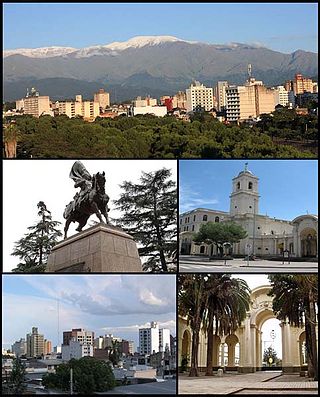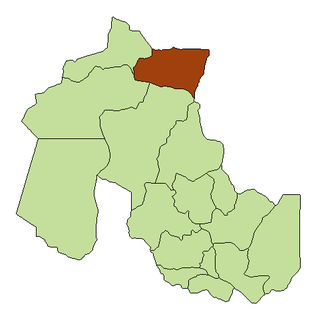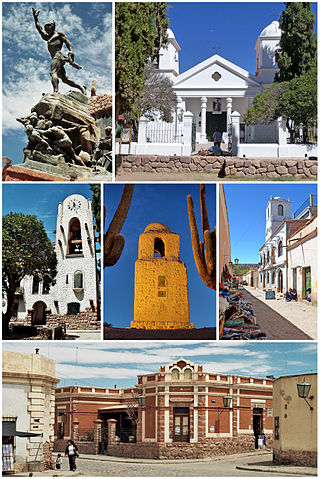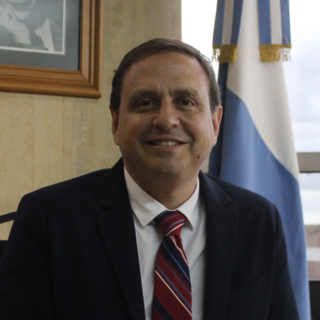
Jujuy is a province of Argentina, located in the extreme northwest of the country, at the borders with Chile and Bolivia. The only neighboring Argentine province is Salta to the east and south.

San Salvador de Jujuy, commonly known as Jujuy and locally often referred to as San Salvador, is the capital and largest city of Jujuy Province in northwest Argentina. Also, it is the seat of the Doctor Manuel Belgrano Department. It lies near the southern end of the Humahuaca Canyon where wooded hills meet the lowlands.
Departments form the second level of administrative division, and are subdivided in municipalities. They are extended in all of Argentina except for the Province of Buenos Aires and the Autonomous City of Buenos Aires, the national capital, each of which has different administrative arrangements.

San Nicolás de los Arroyos is a city in the province of Buenos Aires, Argentina, on the western shore of the Paraná River, 61 km (38 mi) from Rosario. It has about 133,000 inhabitants. It is the administrative seat of the partido of the same name. It is sometimes called Ciudad de María due to a series of Marian apparitions that led to the erection of the Sanctuary in honor of Our Lady of the Rosary of San Nicolás that began during the 1980s and were approved by Bishop Cardelli of the diocese as "worthy of belief" in 2016.

The Quebrada de Humahuaca is a narrow mountain valley located in the province of Jujuy in northwest Argentina, 1,649 km (1,025 mi) north of Buenos Aires. It is about 155 km (96 mi) long, oriented north–south, bordered by the Altiplano in the west and north, by the Sub-Andean hills in the east, and by the warm valleys in the south.

La Quiaca is a small city in the north of the province of Jujuy, Argentina, on the southern bank of the La Quiaca River, opposite the town of Villazón, Bolivia. It lies at the end of National Route 9, 289 km (180 mi) from San Salvador de Jujuy, and at an altitude of 3,442 m (11,293 ft) above mean sea level.

Olavarría is a city in the province of Buenos Aires, Argentina. It is the administrative seat of the Olavarría Partido and has over 111,320 inhabitants, per the 2010 census [INDEC].

LRA Radio Nacional, also known as Radio Nacional Argentina, is the Argentine national radio station, and part of the national public media system. It started transmitting in 1937 as LRA Radio del Estado and changed its name to the current one in 1957. Since 1949, National Radio is also in charge of the Radiodifusión Argentina al Exterior, an international service that broadcasts in numerous languages.

San Francisco de Tilcara is a city in the province of Jujuy, Argentina, and the head town of the Tilcara Department. It had 6,249 inhabitants at the 2010 census [INDEC]. Traces of human habitation in the area date back more than 10,000 years, making it one of the oldest continuously inhabited settlements of Argentina.

Humahuaca is a small city in the province of Jujuy, Argentina. Since 2003 declared World Heritage Site by UNESCO at the Paris conference. It has 11,369 inhabitants as per the 2001 census [INDEC], and is the principal town (seat) of the Department of Humahuaca. The city is widely known for its location at the Quebrada de Humahuaca, along the Eastern valley of the central Andean Altiplano.

The National University of the Littoral is a public university in Argentina. It is based in Santa Fe, the capital of Santa Fe Province. It has colleges and other academic facilities in Esperanza, Reconquista and Gálvez, also in Santa Fe Province.

The Central Northern Railway was the first 1,000 mm railway built by the Argentine State Railway. Its aim was to extend the existing British-owned Central Argentine 5 ft 6 in broad gauge) railway from Córdoba to Tucuman and metre gauge was chosen for economic reasons.
Events from the year 2010 in Argentina
Events from the year 2009 in Argentina.

Alejandro Ariel Vilca is an Argentine activist, garbage worker, trade unionist and politician, active in the Socialist Workers' Party (PTS). A member of the indigenous Qulla people, Vilca was elected to the provincial legislature of Jujuy Province in 2017 on the Workers' Left Front (FIT) list, which won 18% of the vote. In 2021, he was elected to the National Chamber of Deputies.
Events from the year 1990 in Argentina

María Carolina Moisés is an Argentine politician, currently serving as a National Senator for Jujuy Province. Originally a member of the Justicialist Party, Moisés has co-led the local Arriba Jujuy party since 2013. She previously served as a National Deputy on two occasions, from 2019 to 2023, and from 2005 to 2009. She has also served as a member of the provincial legislature of Jujuy and as a councilwoman in her hometown of San Pedro de Jujuy.

Pedro Ortiz de Zárate was an Argentine Roman Catholic priest and Giovanni Antonio Solinas was an Italian Roman Catholic priest and a professed member of the Society of Jesus. Zárate served in a local municipal role before he was married and had two children. He was widowed and decided to enter the priesthood once his two sons were old enough to handle the change; he was a noted preacher and envisioned himself as one that would convert and preach amongst the local Argentine native tribes. Solinas left for the Argentine missions alongside three companions and moved from place to place before he settled in the Salta province. Both priests were slain after two tribes of natives decided to deceive them to preach and work in their village before ambushing and killing both priests; eighteen others were slain alongside them and their bodies left to be discovered as the assailants fled in fear of Spanish forces that were not too far from their position.

Guillermo Eugenio Mario Snopek is an Argentine politician of the Justicialist Party. He has served as a National Senator for Jujuy Province from 2017 to 2023, having served in lower chamber of Congress from 2015 to 2017 and in the Legislature of Jujuy from 2009 to 2015.

















